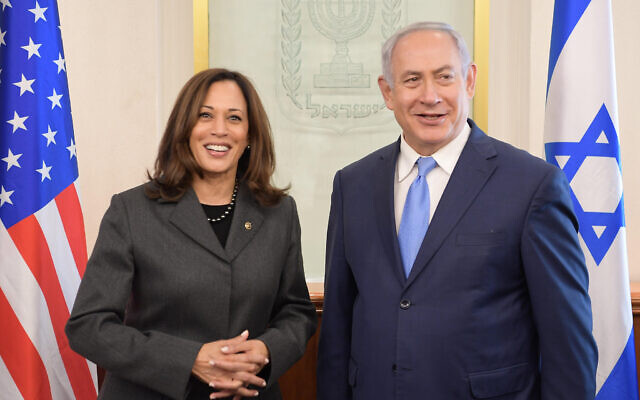Kamala Harris – the political and personal resonance
'At a time when we, in our community, are exploring issues around women’s participation in community leadership, Kamala Harris’s election sends an important message'.

WHILE Sunday saw the revelatory results of the 59th US presidential election, it was much more than just a victory for Joe Biden.
As reported – and widely celebrated by countless women, minorities and people of colour worldwide – Kamala Harris was elected vice-president. In a quartet of “firsts”, Harris is the first female, first Black, and first South Asian person to serve in the position. Further, Harris and Jewish husband Douglas Emhoff will fly the flag as the first interfaith Jewish family in the position.
The embodiment of diversity, the appointment of Harris was relished by supporters as a beacon of hope as she shatters glass ceilings at a time when a stalled trajectory of women in positions of political leadership prevails.
But what are her views on Israel? What does her appointment mean for Jews worldwide? And what does it mean to Jewish women?
While US President Donald Trump told his supporters that Biden had fostered an “unholy alliance with the most extreme and dangerous elements of the radical left”, the views expressed by Harris in her three years as a Californian senator see her placed in the pro-Israel camp of the Democrat party.
Despite telling the Arab American News site last week that she vowed to restore economic and humanitarian assistance to the Palestinian people, to reopen the US consulate in East Jerusalem in addition to taking “immediate steps to … address the ongoing humanitarian crisis in Gaza”, she has not gone so far as to label Israel as responsible in any way for that humanitarian situation.
In fact, deemed to be “more AIPAC than J-Street”, Harris has spoken to the lobby group three times, to the disdain of the more progressive factions of her party.
The first resolution she co-sponsored as a senator was one effectively condemning the Obama-Biden administration’s decision to abstain on a UN Security Council resolution condemning Israeli settlements in the West Bank.
Harris highlighted the co-sponsorship in a 2017 speech at AIPAC, saying it would help “combat anti-Israel bias at the United Nations and reaffirm that the United States seeks a just, secure and sustainable two-state solution”.
In November last year – as over 360 rockets pelted Israel from Gaza – Harris denounced the attacks, telling Jewish Insider that “Israel has the right to defend itself.”
And when asked by the New York Times just a few months prior if Israel meets human rights standards, Harris said, “Overall, yes.”
Australia–Israel Jewish Affairs Committee senior analyst Naomi Levin affirmed, “Harris supports Israel’s existence as a Jewish, democratic state alongside a future Palestinian state and she has stated her wish that support for Israel not become a partisan issue in the US.”
Reflecting more broadly on the significance of Harris’ appointment, Levin noted, “Those who fought for women’s suffrage would be disappointed to learn it would take 100 years for the US to elect its first female leader. However, they would likely be pleased with Kamala Harris.”
Echoing Levin’s sentiments, CEO of the Zionist Federation of Australia Ginette Searle said the election of Harris “is inspirational to women everywhere – and demonstrates that women can and will continue to be more present in leadership positions – whether in elected political roles, in the highest echelons of business or in local and community based organisations”.
“At a time when we, in our community, are exploring issues around women’s participation in community leadership, Kamala Harris’s election sends an important message.”
A father to three young girls, co-CEO of the Executive Council of Australian Jewry Alex Ryvchin told The AJN that he hopes the election of Harris will inspire his daughters “to pursue their dreams without limits”.
National Council of Jewish Women of Australia (Victoria) CEO – and New Jersey native – Alexandra Silver concurred, adding that as the mother of twin daughters, she is “over the moon to use this historic moment to prove to my girls they can reach for the stars, dream big and with hard work achieve their goals”.
For young, Jewish women embarking on a career in politics, Harris’s election bears deep resonance. Lexi Kowal, an electorate officer in the office of federal Liberal MP Katie Allen, recalled the misconception she held when discovering her interest in politics: “There is no place for women in the highest echelons of our society.”
She continued, “But this has since been disproven. Certainly, this week’s events have cemented the notion that whenever there are seats at the table, women must play a key role.”
Meanwhile, political staffer in the office of federal Labor MP Josh Burns, Tobi Rosengarten mused, “Seeing a woman, and a woman of colour, elected Vice-President of the United States does not erase the sexism and racism experienced by any person anywhere. But it does demonstrate that we do not need to wait for society to address these problems before we can achieve our wildest dreams.
“I have no doubt she will inspire generations of women, myself included, to use our voices to demand progress and change – and to defy those who tell us ‘No’.”
WITH TIMES OF ISRAEL

comments